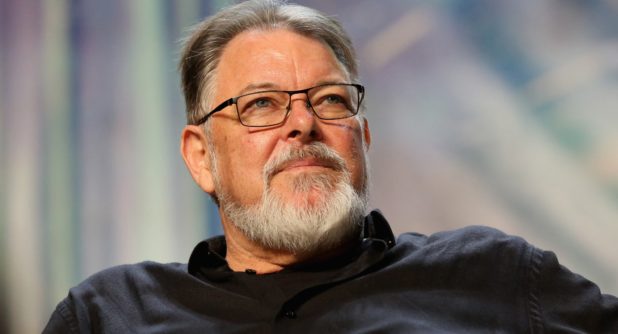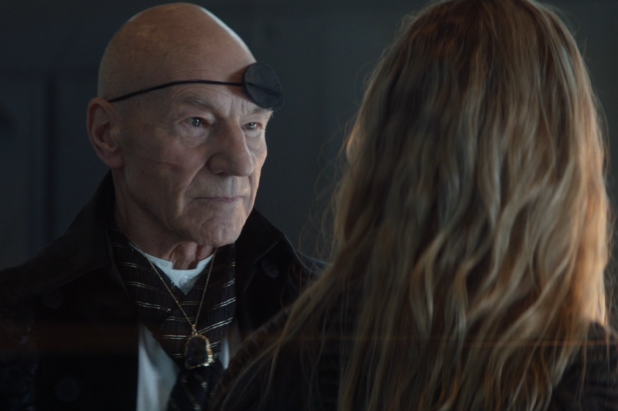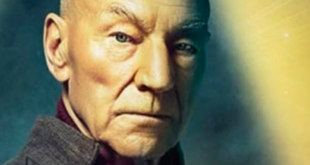Andrew Anglin
Daily Stormer
February 23, 2020

Jonathan Frakes is a beloved part of the Star Trek franchise. He played the character of First Officer William Ryker on The Next Generation, and also directed several episodes of that show. He went on to direct many episodes of other Star Trek series that he was not involved in as an actor, along with two Star Trek theatrical films. Recently, he has directed episodes of The Orville, Seth MacFarlane’s Star Trek parody show that is universally considered to be better than Star Trek: Discovery and Star Trek: Picard.
However, I guess because he needs the money, he also agreed to direct episodes of Star Trek: Picard. Thursday’s episode 5 (which I reviewed Saturday) was one of his.
Although this was by far the best episode of the series so far, it was still an absolute piece of crap. Following the airing of the episode, Frakes gave an interview to The Hollywood Reporter, in which he more or less admitted that the show is not Star Trek, as it does not follow any of the principles laid out for the show by its creator Gene Roddenberry.
It’s fitting that Jonathan Frakes directed this week’s Star Trek: Picard episode, which marks the first significant on-screen encounter between Star Trek’s most popular former Borgs: Jean-Luc Picard (Patrick Stewart) and Seven of Nine (Jeri Ryan).
Frakes, who directed “Stardust City Rag,” also helmed Star Trek: First Contact — the hit 1996 feature film that further explored the aftermath of Picard’s assimilation into Locutus of Borg, the alien race’s spokesman for their first attempt to add humanity to their collective. But his reunion tour with the Borg wasn’t planned.
“It was completely the luck of the draw,” Frakes tells The Hollywood Reporter. “But I was grateful to be apart of reintroducing fans to Seven, particularly their mini-scene — where these two former Borgs — they exchange their baggage and their feelings about having been ‘Borg-ified.’ It’s one of my favorite scenes I’ve ever done.”
…
The import of such a scene, especially one between two of Trek’s most popular actors and characters, wasn’t lost on Frakes. If for no other reason other than the scene represents a sharp contrast to the more “homogenized” way his series, Star Trek: The Next Generation, handled such drama.
“We never could have done [a scene like] this on our show,” Frakes explains. Why? Gene Roddenberry. The creator of Star Trek believed that, in TNG’s 24th Century, there would be no conflict amongst “the family, the crew of the Enterprise,” and therefore no drama or emotional catharsis on the level Picard displays here. The actor-director, who will reprise the role of Riker, Picard’s former first officer, on Picard, credits both the episode’s writer, Kirsten Beyer, and showrunner and executive producer Michael Chabon for allowing the characters to be pushed to such vulnerable places that TNG couldn’t do.
He’s putting this in nice terms.

But when he says that he “credits” these people, what he actually means is that he “blames” these people, who are lazy, entitled Jews.
“The scene was mostly worked out with the help of Michael Chabon and our wonderful writers and new additions to the Star Trek family: Akiva Goldsman, Alex Kurtzman, Kirsten Beyers. It’s such a simple and beautifully-performed scene between the two actors,” says Frakes.
…
Another heartbreaking moment in this episode — which, don’t worry, has one hell of a phaser battle in it, too — is the scene between Raffi (Michelle Hurd) and Gabriel, her estranged son on Freecloud. To have two scenes in one episode was “refreshing” for the Trek veteran.
“As we know, conflict is what creates drama. So, on Next Gen, it was a very challenging set of rules — primarily for the writers — to find ways to create drama. In this new version of Star Trek, which honors what Roddenberry laid out — in terms of the optimism and respect toward themes like racism — all of those elements are sort of strongly rooted in this show,” says Frakes. “But the notion of self-doubt, the vulnerability — especially for a [character] like Picard — the damage of past experiences, are so much more compelling to watch … It’s a denser show than Next Gen, I think that’s fair to say. Pushing Picard to these places, watching Patrick act that out — and he was in the writer’s room as they developed this story — it’s all so rewarding to see.”
By “rewarding to see” he of course means “a cruel punishment.”
The fact that he notes that the parameters laid out by Roddenberry made it “challenging” to write the show, and then notes that this new set of writers simply threw out those parameters is hilarious.

Because the rules laid out by Roddenberry are what made the show so uniquely interesting. It is because the writers were challenged to come up with stories that fit into these rules, and that meant they had to really go deep and come up with creative stories to support moving character interactions.
Chess is a fascinating game that people have enthusiastically played for 1,500 years because of the rules of the movement of the pieces, which require people to come up with complex strategies. If every piece was allowed to move in every direction, it would not be an interesting game, and would not result in complexity.
There are approximately 10120 possible games of chess. But the writers of Star Trek: Picard have turned the show into tic-tac-toe, where the only options are:
- Someone gets angry
- Someone starts crying
- Violence
This does not make the show more interesting or compelling, it makes it stupid and boring and the exact same thing as any other show.
Showing “intense” soap opera scenes of people yelling or crying, and showing violent shootouts and explosions, is fundamentally boring for the mere reason that we’ve all seen so much of this.

Star Trek was always unique and cerebral, and of course writing a show like that requires higher levels of intelligence and creativity than writing a soap opera with explosions.
Turning Star Trek into an “emotional rollercoaster” is actually somehow dumber than turning it into a slapstick comedy or a musical. But transforming it into either of those things would require a lot of work, and these writers simply wanted to vomit up the easiest thing possible.
The Jews writing this show are lazy and entitled. They do not have the ability to or any interest in creating complex stories, and because they believe they are God’s chosen ones, they do not feel they should have to produce anything special, and that the goyim should simply be forced to watch whatever crap they decide to shove on them.
 Daily Stormer The Most Censored Publication in History
Daily Stormer The Most Censored Publication in History


